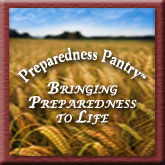Face Perilous Times with “Safe Harbors” Says Elder Ronald A. Rasband
by D. Louise Brown
Safe harbors are critical for those facing the buffetings of today’s calamitous environment said Elder Ronald A. Rasband of the Quorum of Seventy to LDS Business College students during a devotional address delivered Nov. 30, 2005. He explained that his son, returning from a two-year mission to Russia just the day before, had many questions about life, including how to find balance between following the commandments of marrying and starting a family with trying to exist in a worldly environment.
Elder Rasband directed students to Mosiah 2:5-6. There he related the story of how the gathered multitude pitched their tents with the doors facing the temple to hear King Benjamin’s address. “But the sad footnote is found a generation later in Mosiah 26:1,” Elder Rasband said: “Now it came to pass that there were many of the rising generation that could not understand the words of King Benjamin, being little children at the time he spake unto his people; and they did not believe the tradition of their fathers.” Though these families had been there at the temple site, the young children playing in the tents did not understand the message and a generation later, did not accept it, Elder Rasband said. “Do we have reason to be concerned today?” he asked, adding, “You are the rising generation. You are the generation of my children. What about your rising generation? What about your children’s generation? We have reason to be concerned.”
Elder Rasband taught of warnings from prophets, both ancient and modern. He noted that two General Conferences ago, the scripture most often quoted was II Timothy 3:1: “This know also, that in the last days perilous times shall come.” Verses two through five continue: “For men shall be lovers of their own selves, covetous, boasters, proud, blasphemers, disobedient to parents, unthankful, unholy, Without natural affection, trucebreakers, false accusers, incontinent, fierce, despisers of those that are good, Traitors, heady, highminded, lovers of pleasures more than lovers of God; Having a form of godliness, but denying the power thereof.”
“Did Paul have a vision of our day, or what?” Elder Rasband said, adding, “This is part of the environment the ‘rising generation’ faces every day.” He also noted that Nephi spoke of this same environment in II Nephi 28:20: “For behold, at that day shall he rage in the hearts of the children of men, and stir them up to anger against that which is good.” And in D&C 1:17, the Prophet Joseph Smith wrote of the “calamity which should come upon the inhabitants of the earth.”
Elder Rasband acknowledged that facing such an environment could easily cause people to wonder if they should marry and bring children into this world. “Let’s shift now to today’s counsel and comfort,” he said, suggesting that by following the words of the apostles and prophets, students can develop for themselves “four safe harbors.”
Home and family are the first harbor, Elder Rasband said as he explained his gratitude for a childhood where his mother was able to stay at home with the children while his father drove a truck for a living. “Money made no difference in the happiness of a wonderful family. I was grateful and always will be for the home I grew up in,” he said.
Wards and stakes are the second harbor. “The safety net of the ward [or stake] provides a safe harbor environment,” Elder Rasband said. He quoted D&C 115:6: “And that the gathering together upon the land of Zion, and upon her stakes, may be for a defense, and for a refuge from the storm, and from wrath when it shall be poured out without mixture upon the whole earth.”
Temples provide the third safe harbor. Elder Rasband noted that in several temple dedicatory prayers, President Gordon B. Hinckley said the temple would shine as a bright light, as “a refuge from the storms and stresses of the world.” He also noted that in Alma 26:5-6, Ammon rejoiced at the thousands of converts who were brought into the fold as “sheaves,” and gathered into “garners,” or temples, for safety. Verse six explains the temple harbor: “Yea, they shall not be beaten down by the storm at the last day; yea, neither shall they be harrowed up by the whirlwinds; but when the storm cometh they shall be gathered together in their place, that the storm cannot penetrate to them; yea, neither shall they be driven with fierce winds whithersoever the enemy listeth to carry them.”
The final harbor is a testimony grounded in the Lord Jesus Christ, Elder Rasband taught. Nephi understood the safety in such a testimony when he wrote in II Nephi 25:23: “And we talk of Christ, we rejoice in Christ, we preach of Christ, we prophesy of Christ, and we write according to our prophecies, that our children may know to what source they may look for a remission of their sins.”
“We talk, rejoice and preach so you and your children and grandchildren can know to what source they may look in these perilous times,” Elder Rasband said. He urged, “Go forward with confidence, go forward in an appropriate time to find that eternal companion, and then feel free to bring children into this world, knowing you have these safe harbors of home and family, wards and stakes, temple, and testimony…. Move forward to build and establish this Church. You will be able to bring this rising generation along safely.”
Subscribe to:
Post Comments (Atom)



No comments:
Post a Comment